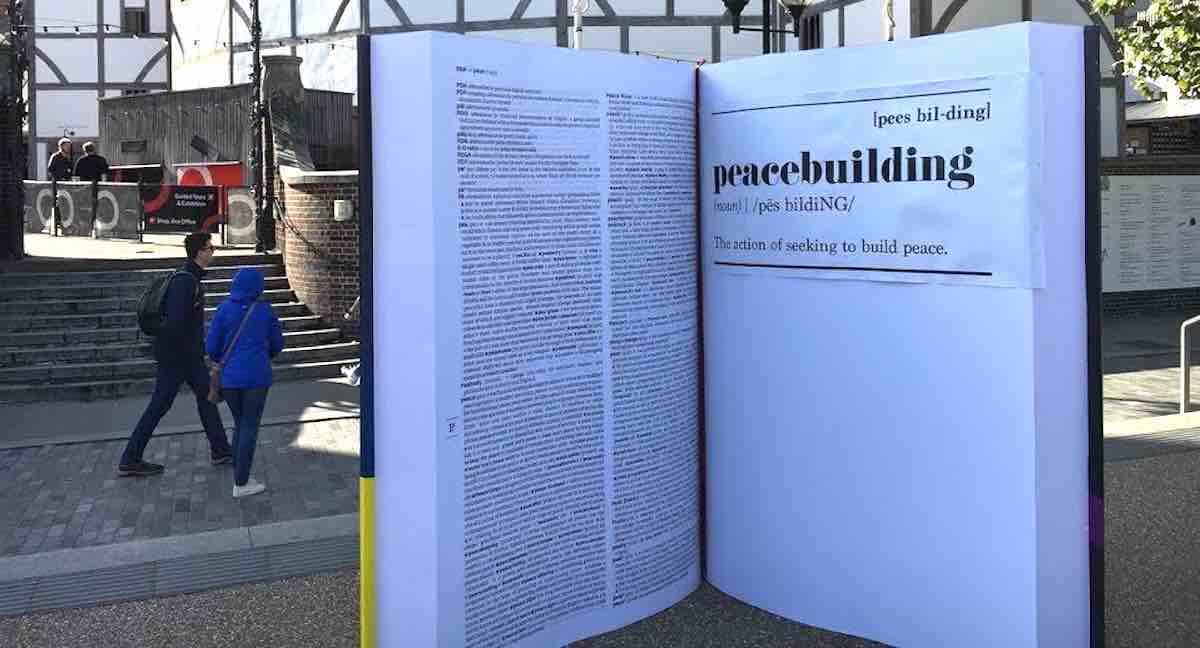Reprinted with permission from Peace News Network
September 29th, 2018
The word “peacebuilding” gets 7 million hits on Google, yet isn’t in most dictionaries—but a campaign is well on its way to changing that.
“Peacebuilding” was coined in the 1970’s by Norwegian scholar Johan Galtung, who defines it as projects that involve “concrete action” towards peace. Mike Jobbins from Search for Common Ground says it’s been a real frustration in the peacebuilding field to constantly get the Microsoft Word red squiggle from the spellchecker.
“We have UN departments, we have legislation in the States, we have governmental departments from Nigeria to Myanmar that use the word peacebuilding, but fundamentally we’re not well understood in the general public,” Jobbins said. “You sit next to someone on an airplane and say ‘I work for a peacebuilding organization’ and people don’t really know what that means, and there’s so many great people doing such amazing things around the world that we thought it was time to make sure that gets recognized.”
Harriet Lamb, CEO of International Alert, pointed to the variety of new words that have recently been introduced to dictionaries that are being recognized as part of the English language. “You’ve got words like ‘hangry, which means you’re so hungry you’re angry, through to ‘instagramable’, ‘bingable’, ‘totes’ and ‘adorbs’. Yet peacebuilding – an incredibly serious concept that’s been around for 40 years has still not been recognized in our lexicon of words, so that’s why we launched this campaign.”
The campaign, led by several organizations such as Alliance for Peacebuilding, Conciliation Resources, International Alert, Peace Direct and Search for Common Ground, seems to be gaining followers on social media and has had some success.
“We’re super pleased that in the last week, we’re now in three – Collins Dictionary, Cambridge Dictionary and Macmillan Dictionary have all added it in so it’s fantastic progress in just a week after 40 years of set-backs,” said Jobbins.
WATCH: After Man Plays His Cello at Bomb Site, He Spurs Citywide Movement to Combat Violence With Music
Oxford University Press confirmed that while “peacebuilding” is not currently covered in the Oxford English Dictionary, it will be considered. “We have collected evidence for the term and will consider it for potential inclusion in a future update,” their publicist said.
Leaders of the campaign have been inspired by the response they’ve received from the public, said Lamb. “We’ve had lots of positive responses, and from the dictionaries themselves, so we are really hopeful the campaign will achieve its first objective of ensuring peacebuilding takes its rightful place.”
Ms Lamb said getting the term peacebuilding into the dictionary is a first step in a much larger issue. Peacebuilders are keen to see peacebuilding used as a viable option in conflict zones, and for policy makers to know that it works, is popular, and is cost-effective.
(WATCH the video below)
Help Your Friends Read The Good News By Sharing It To Social Media – Photo by Peace News Network





















I haven’t heard the use of that word by many people before in every day conversations although I like the idea of seeking peace a lot.